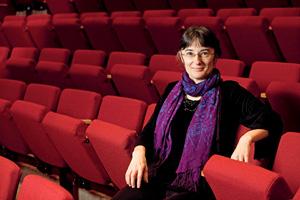By Emily Gold Boutilier
 After researching an obscure Russian-born composer, Klára Móricz, a music professor, organized the world premiere, at Amherst, of three arias from the opera The Blackamoor of Peter the Great. |
It began when a Russian professor, Stanley Rabinowitz, steered a music professor, Klára Móricz, to documents by an obscure Russian-born composer.
The composer is Arthur Vincent Lourié, and a small number of his personal papers are part of the college’s Center for Russian Culture, which Rabinowitz, the Henry Steele Commager Professor and Professor of Russian, directs.
“I’d never heard of him before,” Móricz says of Lourié. The composer, important in Russia in the 1910s, was a close associate of Igor Stravinsky in the late 1920s and early 1930s and went on to immigrate to the United States. All but forgotten by the 1950s, he died in 1966.
Móricz, who is the Valentine Visiting Assistant Professor of Music, soon became interested in Lourié’s final opera, The Blackamoor of Peter the Great, based on Alexander Pushkin’s unfinished novel The Moor of Peter the Great. Lourié considered the opera his most important work, yet it had never been performed—not once. It existed only on paper.
Móricz went on to research and write about Lourié and The Blackamoor, which she came to view as a “quintessential Russian Silver Age opera,” even though Lourié completed it while living in the United States in 1961, long after Russia’s pre-revolutionary Silver Age.
Now, thanks to Móricz, The Blackamoor has finally seen the light of day. Last fall marked the world premiere of three arias from the opera, performed in the intimate Rotherwas Room in the Mead Art Museum. The concert of Lourié music also featured short piano pieces and the post-World War II Concerto da camera for solo violin and strings. Performers included several musicians from the Five Colleges, including vocalist Peter W. Shea, a professional singer who works at the UMass library.
The concert coincided with a Mead exhibition on Silver Age Russian costume design and inaugurated a public conference, “Arthur Lourié and the Voice of Silver Age Russia,” intended to shed fresh light on the composer. Móricz organized both the concert and the conference.
Móricz says it was a treat to listen to the arias and the other Lourié music. She says of the Concerto da camera, “You feel like the instruments are speaking and interacting with each other.”
Móricz, who wrote a 2008 book on Jewish identities in 20th-century music, is teaching a course this semester on music by 19th-century composers. Someday, she hopes The Blackamoor will be performed in full, in Russia.
Photo by Samuel Masinter '04